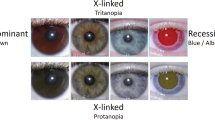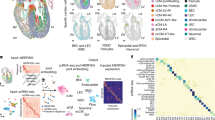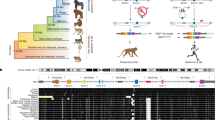Abstract
Genetic hearing impairment affects around 1 in every 2,000 births1. The bulk (approximately 70%) of genetic deafness is non-syndromic, in which hearing impairment is not associated with any other abnormalities. Over 25 loci involved in non-syndromic deafness have been mapped and mutations in connexin 26 have been identified as a cause of non-sydromic deafness2. One locus for non-syndromic recessive deafness, DFNB2 (ref. 4), has been localized to the same chromosomal region, 11q14, as one of the loci, USH1B, underlying the recessive deaf-blind syndrome. Usher syndrome type 1b, which is characterized by profound congenital sensorineural deafness, constant vestibular dysfunction and prepubertal onset of retinitis pigmentosa. Recently, it has been shown that a gene encoding an unconventional myosin, myosin VIIA, underlies the mouse recessive deafness mutation, shaker-1 (ref. 5) as well as Usher syndrome type 1b6. Mice with shaker-1 demonstrate typical neuroepithelial defects manifested by hearing loss and vestibular dysfunction but no retinal pathology. Differences in retinal patterns of expression may account for the variance in phenotype between shaker-1 mice and Usher type 1 syndrome7. Nevertheless, the expression of MYO7A in the neuroepithelium suggests that it should be considered a candidate for non-syndromic deafness in the human population. By screening families with non-syndromic deafness from China, we have identified two families carrying MYO7A mutations.
This is a preview of subscription content, access via your institution
Access options
Subscribe to this journal
Receive 12 print issues and online access
$209.00 per year
only $17.42 per issue
Buy this article
- Purchase on Springer Link
- Instant access to full article PDF
Prices may be subject to local taxes which are calculated during checkout
Similar content being viewed by others
References
Fraser, G.R., Causes of Profound Deafness in Childhood. (Johns Hopkins University Press, Baltimore, 1976).
Kelsell, D.P. et al. Connexin 26 mutations in hereditary non-syndromic sensorineural deafness. Nature 387, 80–82.
Steel, K.P. & Brown, S.D.M. Genetics of deafness. Curr. Opin. in Neurobiol. 6, 520–525 (1996).
Guilford, P. et al. A human gene responsible for neurosensory, non-syndromic recessive deafness is a candidate homologue of the mouse sh1 gene. Hum. Mol. Genet. 3, 989–993 (1994).
Gibson, F. et al. A type VII myosin encoded by the mouse deafness gene shaker-1. Nature 374, 62–64 (1995).
Weil, D. et al. Defective myosin VIIA gene responsible for Usher syndrome type 1B. Nature 374, 60–61 (1995).
EI-Amraoui, A. et al. Human Usher Ib/mouse shaker-1: the retinal phenotype discrepancy explained by the presence/absence of myosin VIIA in the photoreceptor cells. Hum. Mol. Genet. 5, 1171–1178 (1996).
Liu, X.Z., Xu, L.R., Zhang, S.L. & Xu, Y. Epidemiological and genetic studies of congenital profound deafness. Am. J. Med. Genet. 53, 192–195 (1994).
Anderson, H. & Wedenberg, E. Audiometric identification of normal hearingcarriers of genes for deafness. Act a. Otolaryngol. 65, 535–534 (1968).
Meredith, R. et al. Audiometric detection of carriers of Usher's syndrome type II. J. Audiol. Med. 1, 11–19 (1992).
Stephens, D. & Francis, M. The detection of carriers of genetic hearing loss. in: Genetics and Hearing Impairment (eds. Martini, A., Read, A. & Stephens, D. 100–108 (Whurr, London 1996).
Weston, M.D. et al. Myosin VIIA mutation screening in 189 Usher syndrome type 1 patients. Am. J. Hum. Genet. 59, 1074–1083 (1996).
Cope, M.J.T.V., Whisstock, J., Rayment, I. & Kendrick-Jones, J. Conservation within the myosin motor domain: implications for structure and function. Structure 4, 969–987 (1996).
Solc, C.K., Derfler, B.H., Duyk, G. & Corey, D.P. Molecular cloning of myosins from the bullfrog saccular macula: A candidate for the adaptation motor. Auditory Neurosci. 1, 63–75 (1994).
Rayment, I. et al. Three-dimensional structure of a myosin subfragment-1: A molecular motor. Science 261, 50–58 (1993).
Liu, X.Z., Newton, V.E., Steel, K.P. & Brown, S.D.M. Identification of a new mutation of the head region of myosin VII gene in Usher syndrome type 1. Hum. Mutat. (in press).
Levy, G. et al. Myosin VIIA gene: Heterogeneity of the mutations responsible for Usher syndrome type IB. Hum. Mol. Genet. 6, 111–116 (1997).
Chen, Z.Y. et al. Molecular cloning and domain structure of human myosin Vila, the gene product defective in Usher syndrome 1 B. Genomics 36, 440–448 (1996).
Liu, X.Z. & Xu, L.R. Non-syndromic genetic deafness: An analysis of audiograms. Ann. Otol. Rhinol. Laryngol. 103, 428–433 (1994).
Author information
Authors and Affiliations
Rights and permissions
About this article
Cite this article
Liu, XZ., Walsh, J., Mburu, P. et al. Mutations in the myosin VIIA gene cause non-syndromic recessive deafness. Nat Genet 16, 188–190 (1997). https://doi.org/10.1038/ng0697-188
Received:
Accepted:
Issue Date:
DOI: https://doi.org/10.1038/ng0697-188
This article is cited by
-
Genetic background in late-onset sensorineural hearing loss patients
Journal of Human Genetics (2022)
-
Identification of autosomal recessive nonsyndromic hearing impairment genes through the study of consanguineous and non-consanguineous families: past, present, and future
Human Genetics (2022)
-
Human deafness-associated variants alter the dynamics of key molecules in hair cell stereocilia F-actin cores
Human Genetics (2022)
-
The genetic and phenotypic landscapes of Usher syndrome: from disease mechanisms to a new classification
Human Genetics (2022)
-
Usher syndrome type IV: clinically and molecularly confirmed by novel ARSG variants
Human Genetics (2022)



